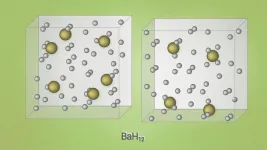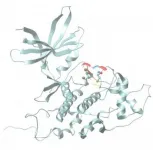Turbulent dynamics in the human brain could revolutionize the understanding of its functionality
According to a new study, published on 8 December in Cell Reports, by Gustavo Deco, director of the Center for Brain and Cognition, and Morten L
2021-01-12
(Press-News.org) Most people experience turbulence primarily from the experience of flying in an airplane. However, turbulence is a key feature of nature and is found everywhere, from rivers to galaxies.
Turbulent-like dynamics are difficult to capture in a still image. However, Leonardo da Vinci did everything possible to identify the underlying order of the phenomenon, which he observed in eddy currents forming randomly in water. In fact, he was fascinated by trying to understand and describe the generating principles governing such complicated dynamics. This is so much so that he coined the phrase "turbolenza", which comes from the Latin word for crowds: "torba". This same idea was the beginning of centuries of research into turbulence. Through the work of the giants of modern physics and mathematics like Andrey Kolmogorov, Yosihiki Kuramoto and Werner Heisenberg, some of the main organizing principles of turbulence have been established. Heisenberg said: "When I meet God, I am going to ask him two questions: Why relativity? And why turbulence? I really believe God will have an answer to the first".
The article: "Turbulent-like dynamics in the human brain" published by the main open access journal Cell Reports on Monday 8 December 2020, focuses on characterizing and identifying the turbulence that occurs in the human brain.
This work is the result of international collaboration between the Center for Brain and Cognition (CBC) at Pompeu Fabra University, the Department of Psychiatry at the University of Oxford (UK), and the Center for Music in the Brain at Aarhus University (Denmark), conducted by the researchers Gustavo Deco (ICREA-DTIC) and Morten L. Kringelbach, who have discovered turbulent-like dynamics in the human brain by means of functional magnetic resonance imaging (fMRI) in a sample of over 1,000 participants.
Turbulence as a fundamental organizing principle of physical systems
Gustavo Deco stated: "Previous research has shown that turbulence is the optimal way to make energy cascade through space-time on many scales, which is not just a visually pleasing phenomenon but also a fundamental organizing principle of physical systems".
The new approach suggested by this work proposes the existence of turbulent-like dynamics as the backbone of the communication of large-scale neural networks
Deco continues: "We have also shown that the physics of turbulence has important practical applications ranging, for example, from improved chemical plants to aircraft and windmills. Our results reveal a new way of analysing and modelling whole-brain dynamics. This new approach suggests the existence of turbulent-like dynamics as the backbone of the communication of large-scale neural networks. This new knowledge could revolutionize our understanding of brain function".
Morten L. Kringelbach, co-author of the research, adds: "Our findings provide a solid, innovative framework for use as novel biomarkers for neuropsychiatric diseases. In the coming years, this theoretical framework could lead to new interventions that might improve the mental health of many people, especially after this turbulent pandemic".
INFORMATION:
ELSE PRESS RELEASES FROM THIS DATE:
2021-01-12
Scientists are combining artificial intelligence and advanced computer technology with biological know how to identify insects with supernatural speed. This opens up new possibilities for describing unknown species and for tracking the life of insects across space and time
Insects are the most diverse group of animals on Earth and only a small fraction of these have been found and formally described. In fact, there are so many species that discovering all of them in the near future is unlikely.
This enormous diversity among insects also means that they have very different life histories and roles in the ecosystems.
For ...
2021-01-12
A new study conducted at the New England Aquarium finds that as climate change causes the ocean to warm, baby sharks are born smaller, exhausted, undernourished, and into environments that are already difficult for them to survive in.
In a recently published paper in the journal Scientific Reports, lead author Carolyn Wheeler, a Ph.D. candidate at the University of Massachusetts Boston and at the ARC Centre of Excellence for Coral Reef Studies at James Cook University, examined the effects of increased temperatures on the growth, development and physiological performance of epaulette ...
2021-01-12
It's been more than a year since the first cases were identified in China, yet the exact origins of the COVID-19 pandemic remain a mystery. Though strong evidence suggests that the responsible coronavirus originated in bats, how and when it crossed from wildlife into humans is unknown.
In a study published online Jan.12 in the journal mBio, an international team of 15 biologists say this lack of clarity has exposed a glaring weakness in the current approach to pandemic surveillance and response worldwide.
In most recent studies of animal-borne pathogens with the potential to spread to humans, known as zoonotic pathogens, physical specimens of suspected wildlife ...
2021-01-12
Exercising regularly is one of the best defences against metabolic diseases, such as obesity and diabetes - but why? It's a question that scientists are still struggling to answer. While exercising changes the molecular behaviour of muscles, it's not well understood how these molecular changes improve metabolic health.
Scientists at the University of Copenhagen have now developed a new technology that allows researchers to study muscle biology on a more detailed level - and hopefully find some new answers. They extracted 'fast' and 'slow' twitch muscle fibers from freeze-dried muscle samples that were taken before and after 12 weeks of cycling exercise training. Their comprehensive analysis of the protein expression of the fibers provides new evidence that the ...
2021-01-12
BOSTON -- By mid-November, the Centers for Disease Control and Prevention had reported that 218,439 health care workers in the U.S. had been infected with COVID-19 -- a likely underestimate due to incomplete data from states. About 3% to 4% of health care personnel who recover from coronavirus infection are expected to become "COVID long-haulers" as they cope with debilitating symptoms 12 to 18 months after the acute stage of the infection clears.
"As COVID-19 surges again, hospitals are facing a shortage of skilled frontline providers who can meet the relentless demands of caring for these patients," says Zeina N. Chemali, MD, MPH, a psychiatrist and neurologist at Massachusetts ...
2021-01-12
A group of scientists from Russia, China, and the United States predicted and then experimentally obtained barium superhydrides' new unusual superconductors. The study was published in Nature Communications.
Chemists and physicists have been hunting down room-temperature superconductors since the first half of the 20th century. Initially, high hopes were placed on metallic hydrogen, but solid metallic hydrogen can become superconducting only at extremely high pressures of several million atmospheres, as it later transpired. Chemists then tried adding other elements to hydrogen in the hope of attaining superconductivity by stabilizing the metallic state under less challenging conditions. ...
2021-01-12
Typically characterized as poisonous, corrosive and smelling of rotten eggs, hydrogen sulfide's reputation may soon get a face-lift thanks to Johns Hopkins Medicine researchers. In experiments in mice, researchers have shown the foul-smelling gas may help protect aging brain cells against Alzheimer's disease. The discovery of the biochemical reactions that make this possible opens doors to the development of new drugs to combat neurodegenerative disease.
The findings from the study are reported in the Jan. 11 issue of the Proceedings of the National Academies of Sciences.
"Our new data firmly link aging, neurodegeneration and cell signaling using hydrogen sulfide and other gaseous molecules within the cell," says Bindu Paul, M.Sc., Ph.D., faculty ...
2021-01-12
Climate changes prompt many important questions. Not least how it affects animals and plants: Do they adapts, gradually migrate to different areas or become extinct? And what is the role played by human activities? This applies not least to Greenland and the rest of the Artic, which are expected to see the greatest effects of climate changes.
'We know surprisingly little about marine species and ecosystems in the Arctic, as it is often costly and difficult to do fieldwork and monitor the biodiversity in this area', says Associate Professor of marine mammals and instigator of the study ...
2021-01-12
Researchers from Skoltech and their colleagues have optimized data analysis for a common method of studying the 3D structure of DNA in single cells of a Drosophila fly. The new approach allows the scientists to peek with greater confidence into individual cells to study the unique ways DNA is packaged there and get closer to understanding this crucial process's underlying mechanisms. The paper was published in the journal Nature Communications.
The reason a roughly two-meter-long strand of DNA fits into the tiny nucleus of a human cell is that chromatin, a complex of DNA and proteins, packages it ...
2021-01-12
A study of students at seven public universities across the United States has identified risk factors that may place students at higher risk for negative psychological impacts related to the COVID-19 pandemic. Factors associated with greater risk of negative impacts include the amount of time students spend on screens each day, their gender, age and other characteristics.
Research has shown many college students faced significant mental health challenges going into the COVID-19 pandemic, and experts say the pandemic has added new stressors. The findings, published in the journal PLOS ONE, could help experts tailor services ...
LAST 30 PRESS RELEASES:
[Press-News.org] Turbulent dynamics in the human brain could revolutionize the understanding of its functionality
According to a new study, published on 8 December in Cell Reports, by Gustavo Deco, director of the Center for Brain and Cognition, and Morten L




